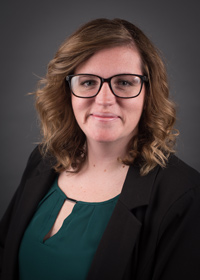Legal Aid Clinic

Overview
The Legal Aid Clinic at KU Law offers students the opportunity to fine-tune their lawyering skills in a fast-paced, live-client setting.
Students represent low-income clients under the careful guidance and thoughtful teaching of supervising attorneys. All clinic students must become licensed for supervised practice through Kansas Supreme Court Rule 715, which requires a minimum of 44 hours of coursework.
The clinic has three components: a weekly class meeting, formal and informal supervision and live-client representation. During class meetings, students discuss cases, practice skills through simulations and discuss readings. In supervised sessions, students work one-on-one with faculty. The highlight for many students is the chance to take the lead role in representing clients. Students build competence by handling initial client interviews, court appearances and motion arguments, and seeing a case through settlement or trial.
The Legal Aid Clinic faculty strives to select and assign cases that offer the greatest opportunity for impact and growth. The clinic's caseload is divided into four general areas:
- A criminal practice for juveniles charged with crimes in Douglas County District Court
- A criminal practice for adults charged with crimes and municipal violations in Lawrence Municipal Court
- A civil practice to represent individuals seeking expungement of criminal records in Douglas County
- A civil practice to provide legal assistance to individuals seeking name changes through the Douglas County District Court and legal advice on gender marker changes
Since 1967, the Legal Aid Clinic has been working to secure “justice for and to protect the rights of the needy” in a wide range of civil and misdemeanor criminal cases.
Inquiring about representation by the Legal Aid Clinic?
Please contact us at 785-864-5564 and/or dgcountylegalaid@ku.edu if we have been court-appointed to represent you, if you have questions about juvenile court or municipal court representation or if you are seeking assistance with an expungement or name change matter.
KU Law Students:
Interested in enrolling in the Legal Aid Clinic? Please complete the Legal Aid application or contact Professor Melanie Daily or Professor Meredith Schnug with any enrollment questions.
Prospective Law Students:
Please contact the Admissions Office for more information about the many hands-on learning experiences available through a legal education at KU.
Legal Aid Clinic Resources
Eligible legal aid interns must satisfy Kansas Supreme Court Rule 715, which requires that they have completed three semesters of course work (44 hours) and be in good academic standing. Professional Responsibility is a prerequisite. Trial Advocacy is a prerequisite or co-requisite. The clinic is a one-semester commitment, with a second-semester option for eligible students.
Clinic applications are usually due about two weeks before a semester’s registration opens. Check with faculty for specific deadlines.
For more information about enrolling in the Legal Aid Clinic, please contact the clinic faculty or stop by 105 Green Hall.
Melanie Daily serves as a clinical associate professor and director of the Legal Aid Clinic. Daily teaches Family Law and is the editor of the Best Practices for Legal Education blog.
Meredith Schnug serves as a clinical associate professor and director of the Legal Aid Clinic. Daily teaches Family Law and directs KU Law’s statewide LEAD program for promising undergraduates committed to a career in law.
Student Testimonial: Reasons why I recommend participating in the Legal Aid Clinic before graduation
Heddy Pierce-Armstrong, L'22
One of the most memorable and beneficial experiences from my time at KU Law will forever remain the Legal Aid Clinic.
The faculty supervising the Legal Aid Clinic is truly top-notch. Throughout the clinic, I built a one-on-one mentoring relationship with both Professor Daily and Professor Schnug. I left the clinic knowing I had two excellent practitioners in my corner willing to help me in any way they could. What I will remember the most about the professors though, is their pure belief in the work they are doing. So rarely do we get to witness that before we leave law school because so many attorneys just find jobs where they can. This is not the case for Professors Daily and Schnug, who have a gift for guiding the next generation of attorneys.
In class, we often tend to shy away from the tough topics of inequities in both the law and the world. This is not the case in the Legal Aid Clinic, where you directly confront how socioeconomic status, race and lived experiences inhibit a person in the legal system. I learned to discern my life experiences and thoughts from those of my clients—what I would do or what would work for me is not the same for clients. Weekly readings aligned with this notion. The professors did not shy away from hard topics.
I could continue on and on with my praise for the Legal Aid Clinic; however, I will note that what I value from the clinic is not what the next person will value. The autonomy and self-direction have specifically benefitted me in ways I can never fully explain. You can count this as my official endorsement to fit clinic experience into your schedule during law school.
Read more about Heddy’s experience with the Legal Aid Clinic.
Questions?
Legal Aid Front Desk
dgcountylegalaid@ku.edu
785-864-5564
Professor Melanie Daily
Clinical Associate Professor
Director, Legal Aid Clinic
melaniedaily@ku.edu
785-864-5302
Professor Meredith Schnug
Clinical Associate Professor
Associate Director, Legal Aid Clinic
mschnug@ku.edu
785-864-5564